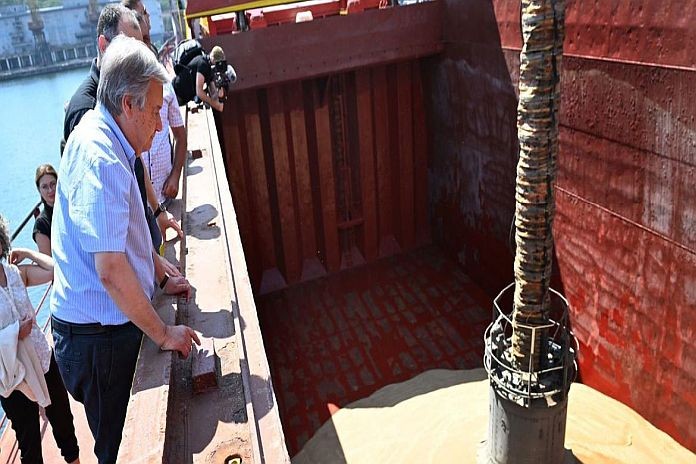NEW YORK, USA – The UN Secretary-General on Wednesday issued a statement warmly welcoming Russia’s decision to resume its participation in the Black Sea Grain Initiative, which has allowed nearly ten million metric tonnes of vital foodstuffs to be shipped from Ukraine.
The UN-brokered deal which is implemented through a Joint Coordination Committee (JCC) in Istanbul involving Russia, Ukraine, and Türkiye, was signed in July, to allow grain, oil and other foodstuffs to leave the war-torn country for markets overseas – many of which are in desperate need of food from Europe’s “breadbasket” to stave off the threat of famine.
On Saturday, Russia said it was suspending its cooperation and would no longer guarantee the safe passage along the agreed humanitarian corridor of ships through the Black Sea, claiming that Ukraine had launched an attack on its military vessels in Crimea.

Diplomatic push
In a statement welcoming the issued by his Spokesperson, António Guterres said he was grateful for the “diplomatic efforts” of Türkiye, “and thanks the UN coordinator, Amir Abdulla, and his team for their work to keep this vital food supply line open.”
In a tweet earlier in the morning, Abdulla said he was looking forward to “working again with all parties in the Initiative.”
The secretary-general has been engaged in non-stop negotiations behind the scenes to get the deal back on track, which is due to expire later this month. On Monday, the UN Security Council debated Russia’s suspension, with senior UN officials stressing that it had had “positive ripple effects throughout the world”.
Relief chief Martin Griffiths and UN trade and development chief Rebeca Grynspan, said the exports from Ukraine and Russia under the deal, had helped lower grain prices, stabilized markets, and helped feed millions where hunger and rising inflation are on the rise.
Deal must be renewed
Russia and Ukraine account for roughly 30 percent of all wheat and barley exports, a fifth of its maize, and more than half of all sunflower oil.
Griffiths said that under the Initiative it was clear that all Member States needed to implement terms agreed, to ensure Russian food and fertilizer exports can also reach global markets.
In his statement, the UN chief said he would continue “his engagement with all actors towards the renewal and full implementation of the Initiative, and he also remains committed to removing the remaining obstacles to the exports of Russian food and fertilizer.”





